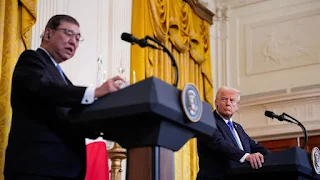Japanese Prime Minister Shigeru Ishiba expressed optimism on Sunday about avoiding higher U.S. tariffs, noting that President Donald Trump had "recognized" Japan's significant investment in the U.S. and the jobs it generates.
During his first White House summit on Friday, Ishiba explained to Trump how many Japanese automakers are contributing to job creation in the United States. While the two leaders did not specifically discuss auto tariffs, Ishiba mentioned that he was uncertain whether Japan would face the reciprocal tariffs that Trump plans to impose on imports.
So far, Tokyo has managed to avoid the trade war that Trump initiated during his early weeks in office. The president has imposed tariffs on goods from Canada, Mexico, and China, although he postponed the 25% duties on his North American neighbors to facilitate negotiations. The escalating trade tensions since Trump returned to the White House on January 20 pose a threat to the global economy.
Ishiba said he believes Trump "recognised the fact Japan has been the world's largest investor in the United States for five straight years, and is therefore different from other countries."
"Japan is creating many U.S. jobs. I believe (Washington) won't go straight to the idea of higher tariffs," he said.
Japanese Prime Minister Shigeru Ishiba expressed confidence that the U.S. will recognize Japan's status as the largest foreign investor in the United States for five consecutive years, distinguishing it from other countries. He stated, "Japan is creating many U.S. jobs. I believe (Washington) won't go straight to the idea of higher tariffs."
Ishiba emphasized the importance of avoiding a tit-for-tat tariff war, advocating for tariffs that "benefit both sides." He warned that any actions that exploit or exclude the other side "won't last," and questioned whether there are valid reasons for imposing higher tariffs between Japan and the U.S.
According to the latest U.S. Commerce Department data, Japan had the highest foreign direct investment in the United States in 2023, amounting to $783.3 billion, surpassing Canada and Germany.
Trump urged Ishiba to address Japan's $68.5 billion annual trade surplus with the U.S., expressing optimism that this could be resolved quickly, especially with Ishiba's commitment to increase Japanese investment in the U.S. to $1 trillion. Ishiba highlighted potential investment areas, including liquefied natural gas, steel, artificial intelligence, and automobiles.
He also touched on Trump's promise to look at Nippon Steel investing in U.S. Steel, as opposed to buying the storied American company - a planned purchase opposed by Trump and blocked by his predecessor, Joe Biden.
Ishiba also discussed Trump's proposal regarding Nippon Steel's potential investment in U.S. Steel, emphasizing that this approach is preferred over a direct purchase, which has faced opposition from both Trump and his predecessor, Joe Biden. "Investment is being made to ensure that it remains an American company. It will continue to operate under American management, with American employees," Ishiba stated. He noted that ensuring the company remains American is a priority for Trump.
Regarding military spending, Ishiba addressed Trump's calls for allies to increase their defense budgets, asserting that Japan would not raise its defense budget without first securing public support. "It is crucial to ensure that what is deemed necessary is something the taxpayers can understand and support," he added.


Post a Comment